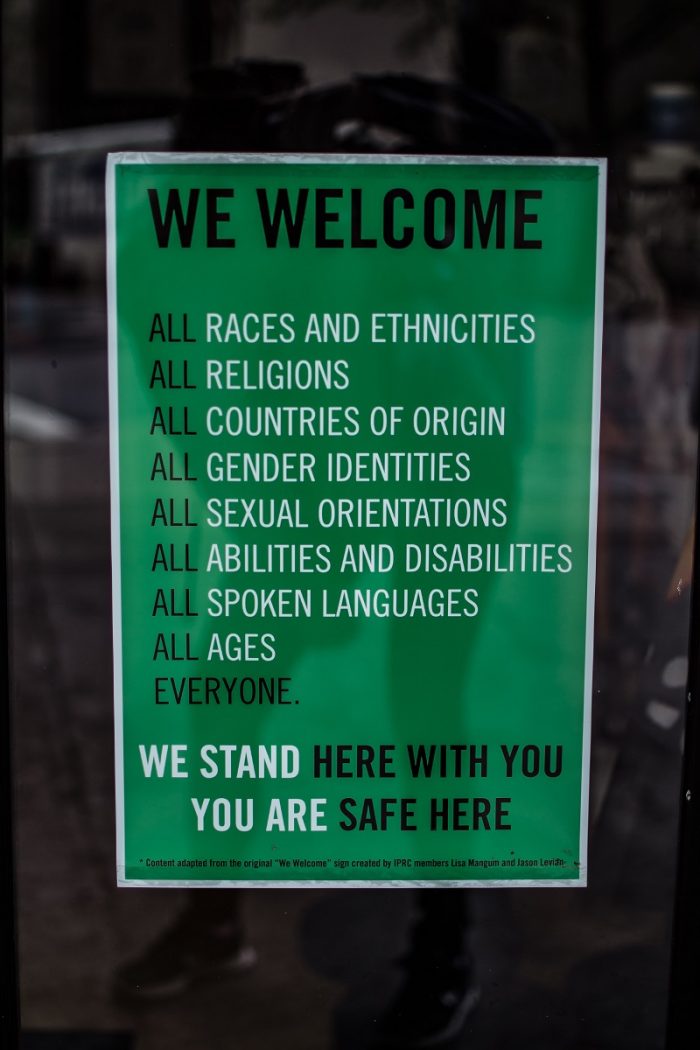I know many people who go about each day without the need to consider others often.
We wake up, make coffee or breakfast, morning duties that may include kids, driving to work, doing your job, going to happy hour with friends, going home to your family, and starting over the next day.
Many days, our interactions occur with the same people: coworkers, family, friends, and neighbors. We may have a couple of interactions with strangers as we go to the gym or grocery store, but for the most part, we aren’t out of our comfort zone often.
Even more than that, we don’t regularly interact with people who are different from us. We socialize with people from similar backgrounds, similar socioeconomic statuses, similar family dynamics. We care about the things that directly touch our lives and that may be the main motivation for how we structure our values, thoughts, and behaviors.
If your child has a disability, this motivates you to learn about it, advocate for it, and try to make a difference. But besides those specific circumstances, we tend to “stay in our lane” in terms of how we relate to others.
If we only surround ourselves with like-minded and similar individuals, we start to forget that not everyone thinks the same way as us. We start taking these assumptions that fit well with the people we are around and apply them to everyone in our society. Our thoughts of “how can I get ahead” can also lead to us only considering people’s opinions who can further us in our career or other aspects of life.
In general, it isn’t often that the average person works to try and understand someone unless they have to, due to it affecting their life, or they find some benefit to doing so. This extends as far as where we grew up, including the town and neighborhood, the grade school, and eventually the college we attended. What did the people around us look like? What were their goals? How was their family life? What was their socioeconomic status? Were they able-bodied? The answers to these questions most likely formed our own norms of what lens we view the world through.
Because of this thinking, there are certain assumptions we can come to. One that circulates frequently is the idea that anyone can “pull themselves up by their bootstraps” and get ahead in life. There are many iterations of this—the idea of the American dream, the thought that unemployed people are lazy, the judgment of homeless people. We also make assumptions of what a life should look like—get a job, own a house, get married, and have some kids. We assume that even if others didn’t come from the same type of childhood environment, that they still have the knowledge and skills that can lead to a better life.
When we only use our own lens to see the world, it leads to a lot of black and white or good and bad thinking. Working for a paycheck is good and stealing is bad, right? Drinking a glass of wine after work is normal and using heroin is bad, right? When things don’t fit into these assumptions, we start to feel a little uncomfortable. We like things to fit nicely in the box we’ve created, and when we question the parameters of that box, it means we have to start questioning our values—which makes sense.
We only know what we know and if we haven’t been challenged to look at life from a different point of view, we may never have to change our ideas of what a “good” or “healthy” life is. We use these experiences to shape our moral code, the guideline of how we judge others and their actions. We take our own experiences and assume that it’s the same experience for everyone. This line of thinking can oftentimes lead to a lot of blame and a lack of empathy and compassion. It’s a lot easier to believe the person who used meth and went to jail for stealing is an evil, bad criminal, rather than wondering what may be going on that could lead someone to make those decisions.
And oftentimes, these assumptions are reinforced, and we may even unconsciously be looking for the instances that reinforce it. If you think people who use meth are inherently bad and you look around at the community and read the police blotter and the newspaper, you’ll most likely see many things that reinforce that belief, thereby making it grow stronger. However, it’s also dismissive of the greater context.
Let’s look more closely at this. Imagine that you aren’t what you would consider “normal.” Imagine that you have a disease, a disorder, an illness, a disability—something that others you. You’re still in this same society, the society that has a version of “normal” and expects everyone to fall in line. The reasonable step is to learn how to fit in, how to be normal. The “normal” people make the rules of behavior in our society, therefore, people learn early on that if they want to play the game—which is essentially just living life in a comfortable way—they need to change aspects of themselves to conform, often at any expense.
But when people have a serious mental illness, trying to fit in to this definition of normal becomes even more difficult.
My job is to literally teach marginalized people how to empathize and behave. My clients have severe mental illnesses and have been continuously involved in the criminal justice system. The therapies I use focus on how our thinking and behavior is linked, and many groups I teach reiterate the importance of seeing thoughts and behaviors from society’s point of view. We’ve created laws that we are all supposed to follow and assume that everyone has learned the same skill set to do so. Instead of creating a society that is open for all types of behaviors and thinking patterns, we rely on the laws to catch people who don’t fit the mold, which happen to be a lot of people with mental illness.
Imagine this: a person is institutionalized their whole life—they grew up in foster care and have spent the majority of their adult life in prison. They’re now out in the world, expected to behave like the typical person. Yet they didn’t learn the proper survival skills; instead of learning that the world is a safe place and that they are loved and cared for, they have been shown over and over that there’s no one to depend on and survival means looking out for themselves and numbing the pain. They adopt “manipulative” traits, but you realize manipulative is just another term for “doing what you need to do to get your needs met.”
The more I work with people who have committed crimes, the more I realize that they aren’t failing society—society failed them.
Society failed them when it didn’t intervene in childhood abuse. Society failed them when they were sent to juvenile detention in lieu of mental health treatment. Society failed them when it punished their addiction instead of wondering why they resorted to substances. Society failed them when it condemned them to a criminal record that will prevent them from finding employment and housing.
These are people who are expected to emerge from a life of abuse and institutionalization and be able to carry on in normal society. When you can’t conform, you are punished. You’re punished with unemployment because your differences make you uncomfortable to be around. You’re punished because it’s difficult to advocate for yourself and your accommodations, or you are homeless and can’t afford new clothes. You’re punished by being ostracized because people don’t understand—because people don’t try to understand. You’re punished with jail time because police officers didn’t understand your mental illness.
The longer I work in this field, the more I see “flaws” and “bad behavior” as survival skills. A child who uses tantrums to get the attention they need from their caregivers becomes the adult who lashes out and “causes a scene” because it’s how they know to get their needs met. The child who was neglected and never allowed to express their emotions becomes the adult who uses substances to escape because they don’t know how to handle difficult feelings. I don’t see this as a flaw, I see it as a coping skill that worked for a while, and now my job is to give them more tools and skills to help them function more effectively in society.
But my job is also to honor their stories and experiences because these don’t make them bad—they make them human.
I wonder how much better and more effective our society could be if we did take the time to try to understand others. If we paused before jumping to conclusions and asked questions when we didn’t understand. I truly believe that by considering others, I not only positively impact them and their experience as a human, but I become a little more human and a little happier as well.
I believe that empathy expands my experiences in life and makes me feel a bigger sense of purpose and connection. An extra couple of minutes to consider someone’s point of view, an extra couple of hours to hear someone’s story or to read a book or other source of educational material—that’s what it takes. I don’t think that’s a lot to sacrifice to make someone’s entire existence more comfortable. I don’t think it’s a lot to ask in exchange for humanizing a person and connecting ourselves to other beings on this planet.
If you think it’s too much, consider living every day being forced to consider what is “normal,” and how to act and how to change yourself or suffer the consequences. What if instead of assuming people are “bad” or intentionally doing things to cause harm or resist the norms, we assumed people were doing the best they can?
I concentrated on mental illness throughout this piece, but this extends to all differences: to people of color, to people who are overweight, to people with physical disabilities, to people with visible and invisible health conditions, to LGBTQ people. We live in a society filled with differences, and sometimes it feels like we see it as an inconvenience rather than something to embrace and celebrate.
I wonder what the world would be like if we took a little more time to consider others.
~









Read 1 comment and reply